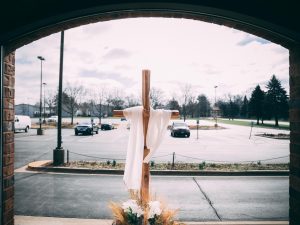Confused and disoriented
Whenever I go through some traumatic or significant event, its impact hits me in waves. I am confused and disoriented. I resist going through the stages of grieving: shock, denial, anger, bargaining, depression, testing, and acceptance. It takes me a while to figure out how to adjust and live my life in light of my new circumstances.
I can hardly imagine the trauma that the followers of Jesus went through during Passion Week, witnessing his arrival into Jerusalem, betrayal, arrest, beatings, whippings, and death. To be honest, I often don’t want to even enter into their nightmare, trying to imagine what it would have been like for them to make sense of all the cruelty and hate they saw unleashed on Jesus.
And just when all their hopes for the immanent reign of the kingdom of God were snuffed out, Jesus shows up in multiple physical post-resurrection appearances. What is shocking to me is that even the accounts of those experiences were traumatic.
I imagine their lives being thrown into utter confusion. They were still in shock. Cowering and shaking, feeling ill, not wanting to eat, weeping, sobbing, holding each other in silence. As in my own experience of trauma, they were confused and disoriented. They didn’t have the will and direction to go on.
A dynamic hope
In many of his post-resurrection appearances, Jesus seemed to intentionally give his followers multiple opportunities to verify that he was indeed physically resurrected. Jesus was showing them that he was a God with skin, muscle, and bone.
Seeing, hearing, and touching the physically resurrected body of Jesus proved to them that God was more powerful than death itself. Not only that, they witnessed the restored body of Jesus, once shredded beyond human recognition, now glorified. This gave them a dynamic hope that God could also raise their broken bodies, that his healing was powerful enough to heal any hurt or wound.
So despite the disciples’ stunned confusion, history tells us how these multiple sightings of Jesus slowly started to sink in. And once they were convinced of the resurrection of Jesus, everything about their lives changed radically.
Their faith was indomitable. History shows us that not even the might and cruelty of the Roman Empire could suppress or stop them from spreading the resurrection message of Jesus. Their bold stand for Jesus caused their enemies to say, “These men have turned the world upside down.” (Acts 17:6)
A supreme priority
What gave them their dynamic faith? They simply continued to walk with Jesus. They walked with Jesus on this earth, prioritizing and acting on what he had told them to do. They lived in partnership with the resurrected and ascended Jesus, partnering with the Holy Spirit.
They were branches connected to their vine, meditating on his words to them constantly, being in a posture of prayer, and meeting in unity with other believers for mutual encouragement.
Eventually they remembered and practised all that Jesus taught them, “You shall love the Lord your God with all your heart and with all your soul and with all your mind. This is the great and first commandment. And a second is like it: You shall love your neighbour as yourself. On these two commandments depend all the Law and the Prophets.” (Mark 12:30)
Paul said it like this to Timothy. “You then, my child, be strengthened by the grace that is in Christ Jesus, and what you have heard from me in the presence of many witnesses entrust to faithful men, who will be able to teach others also.” (2 Timothy 2:1 ESV) First, be strong in your walk with Jesus, then entrust what you have learned from him to others who will also pass it on.
They prioritized the work of Jesus
Jesus predicted that his fame and renown would spread to all nations, beginning in Jerusalem (Luke 24:45-45). History shows us how seriously the disciples reoriented and devoted their lives towards Jesus’ command to make followers of Jesus (Matthew 28:17; Mark 16:15). The followers of Jesus went out and preached everywhere and it was accompanied by signs of God’s divine work.
This quote by N.T. Wright summarizes for me the grand implications of the resurrection and ascension of Jesus, a guide for any follower of Jesus.
The message of the resurrection is that this world matters! That the injustices and pains of this present world must now be addressed with the news that healing, justice, and love have won… If Easter means Jesus Christ is only raised in a spiritual sense—[then] it is only about me, and finding a new dimension in my personal life. But if Jesus Christ is truly risen from the dead, Christianity becomes good news for the whole world—news which warms our hearts precisely because it isn’t just about warming hearts. Easter means that in a world where injustice, violence and degradation are endemic, God is not prepared to tolerate such things—and that we will work and plan, with all the energy of God, to implement victory of Jesus over them all (p. 212).
The physical resurrection of Jesus is proof positive that one day we too will receive our physically resurrected bodies. We will live in a resurrected heaven and earth, healed, justified, and only run by love. While we are still in this broken world, this is the vision for what we are to work for in partnership with the Holy Spirit, all the nations worshipping at his throne.
It all leads to the beatific vision. God with us. All the nations worshipping, embracing, living for and serving a God with skin, muscle and bone for all eternity, with ever-increasing joy. In this life, it means trusting God’s kingdom to come here on earth as it is in heaven, knowing that one day it will happen entirely.
"*" indicates required fields
Share this!
About the Author





